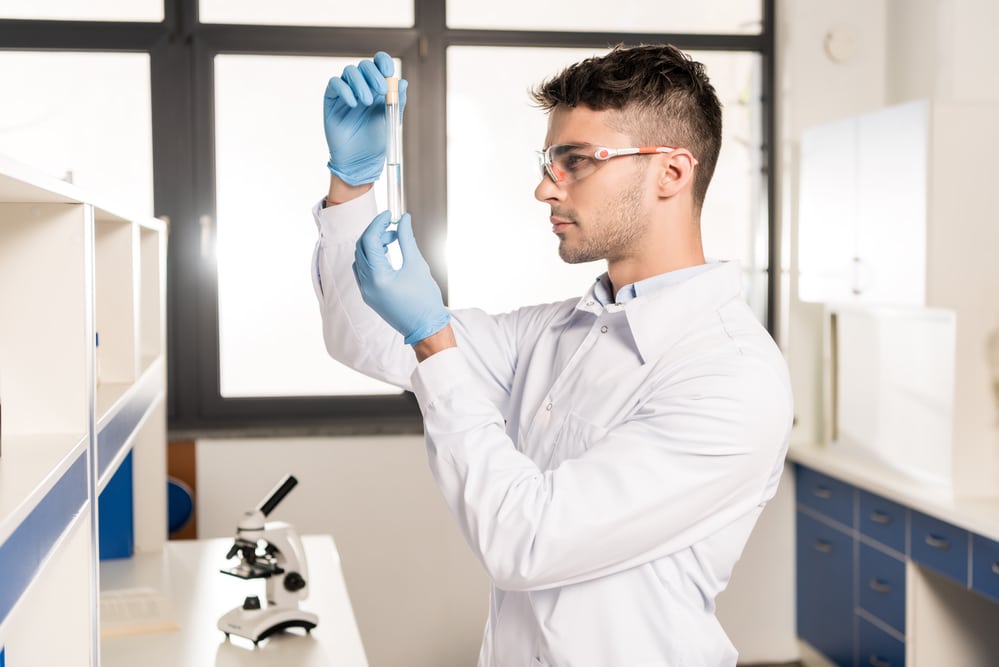The Low T Test — Do I Need to Get Checked?
Do you need a Low T test?
Let’s start by discussing how low testosterone is diagnosed.
Are you feeling chronically run down, experiencing a low sex drive, or feeling a little depressed? If so, it’s possible that you’re experiencing symptoms resulting from low testosterone.

Essentially, the 2 factors that lead to a diagnosis of chronic low testosterone are whether you’re exhibiting the symptoms associated with hypogonadism (the medical term for Low T) and what blood tests reveal about your actual testosterone levels.
The first step to solving any problem (including one concerning your health) is identifying it.
The Low T Test — What Are Your Symptoms?
Let’s talk about the first factor that plays into a diagnosis of low testosterone — your symptoms.
The fact that men’s quality of life is suffering in some way is the reason they seek treatment.
The following are a list of the more common effects of Low T:
- Having little energy
- Losing strength or endurance
- Having a decreased sex drive
- Not enjoying life like you used to
- Feeling sad or depressed
- Feeling grumpy or irritable
- Losing height
- Falling asleep after dinner
- Feeling less productive at work
If these sound familiar, it’s probably time for a visit to your medical provider to take a look at the second determiner of a low testosterone diagnosis.
The Low T Test — What Are Your Hormone Levels?
After identifying the symptoms of chronic low testosterone, we have to assess your current hormonal health — that means blood work.
Most medical providers who treat Low T test primarily for your total testosterone level and make a diagnosis based those findings. The normal range for most men is 300–1000 ng/dl, but there’s a great deal of variance — every man’s body is different. That’s the real value of the Low T test — finding out where you stand.
By virtue of its name, total testosterone sounds like it would be the most important factor contributing to a diagnosis of hypogonadism (the medical term for Low T), but it isn’t.
In fact, the main focus should be on your free testosterone levels.
Free testosterone represents the hormone that’s available to your body for actual use, with the normal range considered to be 9–30 ng/dl, but individual differences still have to be taken into account here, too.
(You can learn more about these numbers and what they mean by clicking here.)
It’s actually a chronically insufficient amount of free testosterone available for your body to utilize that leads to the development of the symptoms of low testosterone.
That means a reliable Low T test needs to include your free testosterone level to provide a truly clear picture of your hormonal health. Any Low T testing center worth the money is going to give you these numbers and more besides. The cost of a Low T test is usually minimal.
(A side note — a diagnosis of low testosterone in young men is unusual, and it can signal greater cause for concern.)
Don’t Forget About Estrogen — Balance Is Key
Our bodies are incredibly complex, and overall hormone health is a powerful determiner of how we feel.
That means it’s necessary to restore your body to hormonal balance — a Low T test could reveal other issues, like low estrogen levels.
Men have estrogen, too — surprised?
It’s called estradiol, and it’s produced when testosterone is broken down to be utilized by the body.
This fact is important because low estradiol symptoms are also unpleasant and can often be mistaken for the symptoms of low testosterone — here are some of the more common effects:
- Fatigue
- Oversleeping
- Anxiety
- Depression
- Irritability
- Sleeping too often
- Erectile dysfunction
- Low sex drive
- Water retention
- Bone loss
- Fat accumulation
Both lists of symptoms, for low testosterone and low estrogen, are quite similar. Hormone imbalance symptoms often overlap, making it more difficult to determine the exact source of your discomfort.
That means a Low T test that provides comprehensive information on all your major hormone levels is critical to establishing an effective treatment plan that’s custom made for you.
What Does a Low T Test Cost?
We’ve gone to great lengths to be to offer a high quality, comprehensive Low T test for only $200.
Two sets of lab tests, done on different days, are required to confirm the diagnosis of Low T. The cost of the two sets is $200, and the associated consultation is free.
We’ve removed the cost barrier so that men can more easily get started reclaiming their quality of life.
Take Our Simple Low T Test
If the common symptoms of low testosterone or low estrogen ring a bell for you, and you’re just not feeling as vibrant as you know you should, visit your medical provider and see if low testosterone is the source of the symptoms that are keeping you feeling less than your best.
If you’d like to investigate a little further, click the button below to learn more about the $200 Low T test offered at TCT.
